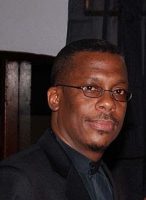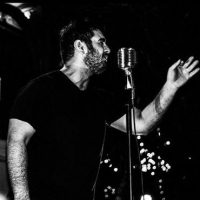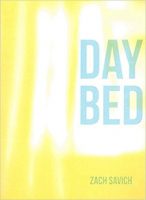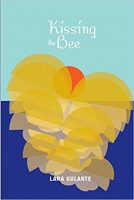January 12, 2018
Edited by David Sanders
Specimen Days
1783—Erik Gustaf Geijer, Swedish historian/poet (Natthimmelen), is born.
1829—Friedrich von Schlegel, German cultural philosopher/poet, dies at 56.
1842—Francois Coppee, French poet, is born.
1939—Jacobus M "Jacques" Hamelink, Dutch writer/poet (Cold Unrest), is born.
1943—Jan R T Campert, Dutch resistance fighter/poet (18 Dead), dies at 40.
1959—Lasana M. Sekou, Saint Martin, Caribbean, poet/author (The Salt Reaper), is born.
1972—Padraic Colum, Irish poet/writer/founder (Irish Review), dies at 90.

mariposa
the mornings are fewer
the nights longer
love is fine and full
here the fight rewards the future
and everybody else but you
makes bad coffee.
by Lasana M. Sekou
“here the fight rewards the future / and everybody else but you / makes bad coffee.” – Lasana M. Sekou
World Poetry
Georgian Poet Accuses Police of Physical and Verbal Abuse

Georgian Poet Zviad Ratiani claims the police officers, who were carrying out police control, arrested and then physically and verbally abused him in a car and later at the police department. Ratiani claims he was at the ATM, when several policemen, dressed in common clothes, approached him and laughed at his orange coat. He says the situation escalated when the policemen grabbed him and put in the car, where they beat him. The poet says he was taken to Dighomi police department, where he was again mistreated.
Poet to Serve Two Years in Prison For Criticizing Iran’s Supreme Leader

Poet Mohammad Mahdavifar has been sentenced to two years in prison for criticizing Iranian Supreme Leader Ali Khamenei, the Center for Human Rights in Iran (CHRI) has learned. In October 2017, a Revolutionary Court in Isfahan Province sentenced the dissident writer to three years in prison and four years in exile in Khash, in Sistan and Baluchistan Province, for the charges of “propaganda against the state,” “insulting the supreme leader,” “insulting Imam Khomeini,” “acting against national security,” and “collaborating with enemy states.”
Writers Union Slams Detention of Yemeni Poet
Al Houthi actions ‘distort image of Islam and exacerbate Islamophobia among non-Muslims’
The General Union of Arab Writers has condemned the detention of Yemeni poet Mohammad Al Louzi by Al Houthi militia on the back of his peaceful anti-coup statements. In a statement on Saturday, Union Secretary-General Habib Al Sayegh said the arrest of Al Louzi contravenes all human rights and international conventions that guarantee peaceful freedom of expression, noting that such criminal acts fit within the extremist approach adopted by Islamists against those who oppose them.
Recent Reviews
'The Complete Poems' of A.R. Ammons Amount to a Profound Experience of Empathy
by Craig Morgan Teicher

A.R. Ammons (1926-2001) was one of the great curmudgeons in poetry — he actually made an aesthetic out of a kind of reticent fuddy-duddiness spiked with a whole bunch of other moods and modes, from mischief to randiness. But it’s as if his willful resistance to some things makes sure there’s room in his wildly questioning mind for openness to so much else.
New Sentences: From Eileen Myles’s ‘Afterglow’
by Sam Anderson
‘You do it too, writer, do not be shy.’
— From “Afterglow (a dog memoir)” (Grove Press, 2017, Page 191), by Eileen Myles, the author of 20 books of poetry and prose.
Certain writers make you want to write. Something about the motion of their sentences lures your mind so close to theirs that, without even trying, in the absolutely normal course of reading, you absorb some of their creative energy. It’s the literary equivalent of an estuary: A river flows into an ocean, and the ocean flows right back into the river, and the mixing of salt water and fresh water creates a magic zone of abundant life where young fish gather and hover and feast and grow.
A.R. Ammons made an aesthetic out of a kind of reticent fuddy-duddiness spiked with mischief and randiness.
Broadsides
Paying to Play: On Submission Fees in Poetry Publishing
by Rachel Mennies
Things we need:
1. Money
Someone wrote the above text on a whiteboard in the Fort Des Moines Museum earlier this year. I’ve returned to it often, ever since a friend retweeted a photo of it, as a reminder of the inherent difficulty in critiquing small presses and literary magazines’ funding practices, especially in light of renewed interest in eliminating the government allocations for the National Endowments for the Arts and Humanities (whose FY2018 allocations are still under congressional consideration). Each time I revisit this tweet, I imagine being in the conference room for this theoretical planning meeting in Iowa, and I think of the similar scarcity-driven discussions I’ve participated in both as poet and editor, largely—in either role—as unpaid labor.
The Resonant Resistances of Political Poetry
Oakland-based publisher Commune Editions’ advocacy of community-based ethics animates volumes of poetry by Nanni Balestrini and Heriberto Yépez.
by Jon Curley
Only a few years old, Oakland-based Commune Editions has already published almost twenty volumes and chapbooks. The press sees itself as a raised fist of new activist poetry. Its brazen effort might seem tenuous or pretentious if not guided by good faith and exemplified powerfully in sundry titles.
Only a few years old, Oakland-based Commune Editions has already published almost twenty volumes and chapbooks.
Drafts & Fragments
New York City's Poetry Brothel Combines Literature With Burlesque For A Whole Different Kind Of Literary Event
by Charlotte Ahlin
If the word "poetry" makes you think of sleepy high school English classes, dusty lecture halls, or incomprehensible Instagram posts, then you should meet the Poetry Whores of New York City. For an entire decade, the Poetry Brothel has been been giving an immersive, literary spin to the world's oldest profession. Poetry at the Poetry Brothel is never confined to the page. At least once a month, in New York and several other cities across the country, the Poetry Brothel creates a one-of-a-kind party: a variety show featuring burlesque, booze, live jazz, painters, aerialists, fortune-tellers, and, of course, the Poetry Whores, who provide one-on-one poetry readings in intimate back rooms. January 9th marks their 10-Year Anniversary Extravaganza Spectacular at Brooklyn's House of Yes.
Amir Safi’s Powerful Poem Dissects The Complexities Of Being Muslim In America
"You do not know yet whether you are expected to be outraged or apologize."
by Dan Clarendon

Button Poetry seeks to "showcase the power and diversity of voices in our community," and one of those powerful voices is that of Amir Safi, whose spoken word poem "Muslim Ban" just hit YouTube on January 2. In under three minutes, Safi elucidates the constant anxiety of living as a Muslim American amid so much hate and violence both stateside and abroad.
In Japan, Haiku on the Rocks
by Adam H. Graham
On a cold and rainy night earlier this year, I found myself at Hoyaken, a matchbook-size bar in Matsuyama, a city in the southwest corner of Shikoku, the least visited of Japan’s four main islands. In Shikoku dialect, Hoyaken means “but anyway,” and there at the bar, chopsticks rested on a perfectly still peanut shell, while sake and literary conversation flowed. The bar’s owners, husband and wife Tomoko and Satoshi Kadoya, talked to me about their favorite poets, both Japanese and American. But haiku was never far from their minds.
Button Poetry seeks to “showcase the power and diversity of voices in our community,” and one of those powerful voices is that of Amir Safi.
Poetry In the News
Foundation for Contemporary Arts Receives $1 Million for Poetry Prize
The Foundation for Contemporary Arts in New York City has announced a $1 million endowment gift from artists Ellsworth Kelly and Jack Shear to establish the C.D. Wright Award in Poetry. Named for poet C.D. Wright, the $40,000 prize will be awarded annually to a poet over the age of 50 whose work exemplifies the lyricism, seriousness, and striking originality of Wright's own work. The award will be administered by the foundation's Grants to Artists program, which was established in 1993 to provide unrestricted cash awards to individual artists in all disciplines.
Vancouver Poet Juliane Okot Bitek Wins 2017 Glenna Luschei Prize for African Poetry

The African Poetry Book Fund announced on December 21 that a local poet is this year's winner of the Glenna Luschei Prize for African Poetry. Vancouver's Juliane Okot Bitek, who is of Ugandan heritage and was born in Kenya, won the US$1,000 award for her 2016 poetry collection 100 Days. Okot Bitek wrote the poems in response to the 20th anniversary of the Rwandan genocide.
Governor Names Case Western Lecturer as Second Ohio Poet Laureate
Ohio Gov. John Kasich has named the state's second poet laureate to a two-year position. Dave Lucas of Cleveland Heights succeeds the first person to hold that job, Dr. Amit Majmudar, a doctor in suburban Columbus.
Congratulations to Juliane Okot Bitek for winning the 2017 Glenna Luschei Prize for African Poetry!
New Books
Daybed by Zach Savich
[Paperback] Black Ocean,104 pp., $14.95

Through intent observation and fractured glances, the poems in Daybedmake everyday elements–yard, bicycle, sidewalk, and breeze–feel elemental. Their consideration of longing, convalescence, and the pleasures of ordinary astonishment is both environmental and emotional. Savich's dedication to attentive, restless lyricism shows what it might look like to at once "say this is heaven / and there is no heaven." Daybed lives in that contradiction's autumnal warmth.
What Replaces Us When We Go by Julie Doxsee
[Paperback] Black Ocean, 96 pp., $14.95
In Julie Doxsee's What Replaces Us When We Go, the urban poet invites transformation into a seaside forest home. Meanwhile, city grit continues to haunt her as cows and dogs roam the coast. Later, the poems travel through deserts as the speaker inhabits animal bodies, alternating between freezing and burning while moving through mechanical and serpentine landscapes in a perpetual state of wish.
Kissing the Bee by Lara Gularte
[Paperback] Bitter Oleander Press, 88 pp., $14.00

Kissing the Bee is Lara Gularte's first and long overdue collection of poetry to be published in a standard edition. To gain access to the significance of her poetry requires an understanding of the poet's cultural heritage out of whose true diaspora of Portuguese and Lusophone speaking people molded her perception as a poet. Born in 1947 in San Jose, California where she grew up, her family came from the Azore Islands to look for gold in California during the 1800s and 1900s. Failing to find gold and "strike it rich," her family turned to ranching to make a living. Her great, grandmother Maria Cabral-Neves, came to Fort Jones, California as a mail-order bride during this period, and today her homestead, remains a local landmark. Lara has memories as a young girl of her great grandmother telling her stories about the old country. As an adult she became curious about her heritage and explored family history. In so doing, she used the writing of poetry as a means to express what she learned about her family and culture.
Book of Cord by Leona Chen
[Paperback] Tinfish Press,73 pp., $13.25
In her debut collection Book of Cord, Leona Chen confronts the loss of Taiwanese identity through colonization and emigration. As she acknowledges her heritage and claims herself as Taiwanese American, "a radical act" with "profound implications," her poems explore histories both recognized and erased. She composes her narrative by way of a series of fragmentary lyric poems in English that is interspersed with Taiwanese Hokkien. Book of Cord is Chen's protest, journey of self- discovery, and rallying cry for the Taiwanese American community.
The Gates of Pearl by Jill Hoffman
[Paperback] Box Turtle Press, 120 pp., $20.00

Decades in gestation, the riveting, poem-memoir The Gates of Pearl is woven together from a mother's Overeater's Anonymous journal written in the 1970s, mother-daughter telephone conversations, and the poet-daughter's exquisite verses… And here is the mother-daughter relationship with Pearly confessing her most private self to her grown child over the telephone. No attempt is made to prettify the mother's fragments and idiosyncratic stream-of-consciousness. Too much of Pearly's shimmering originality, her lyricism, and transgressive voice would be lost.
The poems in Daybed make everyday objects–yard, bicycle, sidewalk–feel elemental.
Correspondences
Ocean Vuong: Poetry, Bodies, and Stillness
by Alexandra Barylski
Poet and essayist Ocean Vuong is the author of Night Sky with Exit Wounds, which was a New York Times Top 10 Book of 2016, winner of the Whiting Award, the Thom Gunn Award, and the Forward Prize for Best First Collection, and finalist for the T.S. Eliot Prize, the Kate Tufts Discovery Award and the Lambda Literary Award. Vuong received a Ruth Lilly Fellowship from the Poetry Foundation and honors from the Lannan Foundation, the Civitella Ranieri Foundation, The Elizabeth George Foundation, The Academy of American Poets. His writings have been featured in The Atlantic, The Nation, New Republic, The New Yorker, The New York Times, The Village Voice, and American Poetry Review, which awarded him the Stanley Kunitz Prize for Younger Poets. He was born in Saigon, Vietnam, and he immigrated to the US at the age of two as a refugee. He lives in western Massachusetts and teaches at UMass Amherst’s MFA for Poets & Writers program.
Writing into the Void: Talking with Mary Jo Salter
by Liz von Klemperer

Mary Jo Salter’s eight books of poetry span a life: childhood, adolescence, motherhood, and so on. And now the latest, The Surveyors, creates a kaleidoscope of humor, heartache, and tenderness. Amidst weighty topics such as caring for aging parents and acknowledging mortality are sharp, precise images. In “Moon-Breath,” a woman lies in bed remembering the feeling of waking up for the school bus when it’s still dark. In “Today’s Specials,” a woman attending a high school reunion sees a list of people in her class who have died in the wall. Salter chooses classic structure and form to convey her message while delving into new autobiographical territory.
Mary Jo Salter’s eight books of poetry span a life: childhood, adolescence, motherhood, and so on.
Envoi: Editor’s Notes
Lessons from the Present: Mary Jo Salter
"There’s an uneasiness that’s based in the material and then there’s a psychological uneasiness. All writers feel this, not just poets. We know in advance that we’re not going be able to reproduce in its wonderful fullness the thing that’s in our heads; we’re going to get some corner of it. We’re going to do the best we can, but we already know it’s beyond us. It’s a bit like walking into a big bookstore. It’s the bookstore of your brain, and you know you’re never going to read all those books. It makes you happy you’re in the bookstore, and you’re nervous because you know you’re never going to read all those books. So the nervousness is also happy. Once I get going writing poetry is one of the happiest things I do, but it is also fraught with all of these anxieties."
—from Writing into the Void: Talking with Mary Jo Salter
“There’s an uneasiness that’s based in the material and then there’s a psychological uneasiness. All writers feel this, not just poets.” – Mary Jo Salter